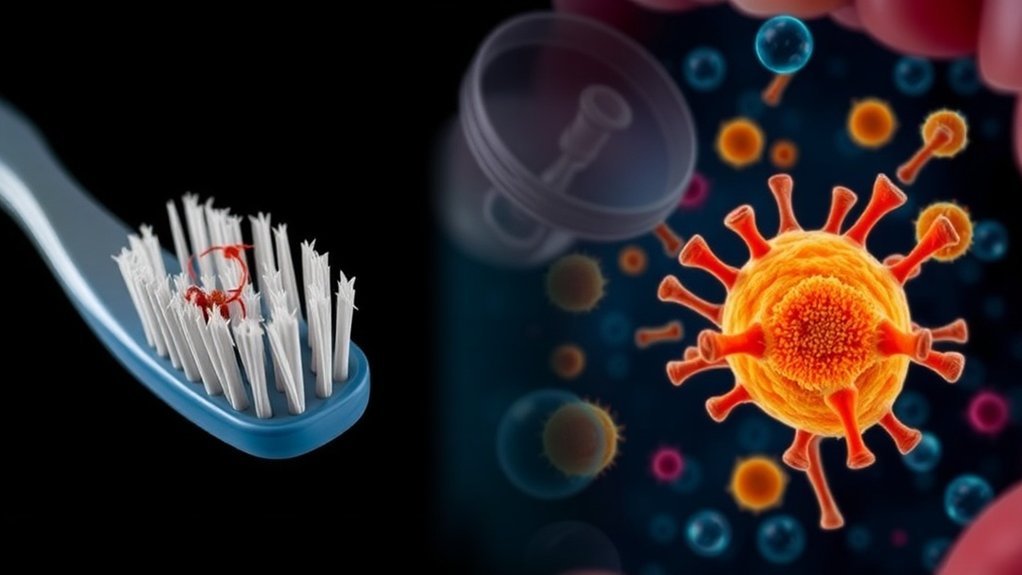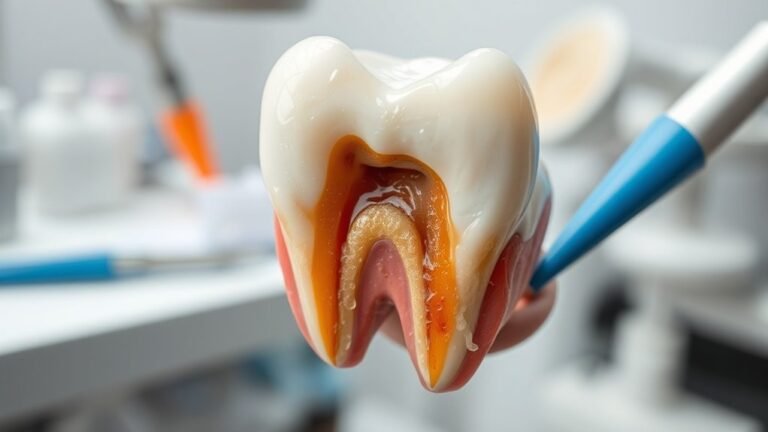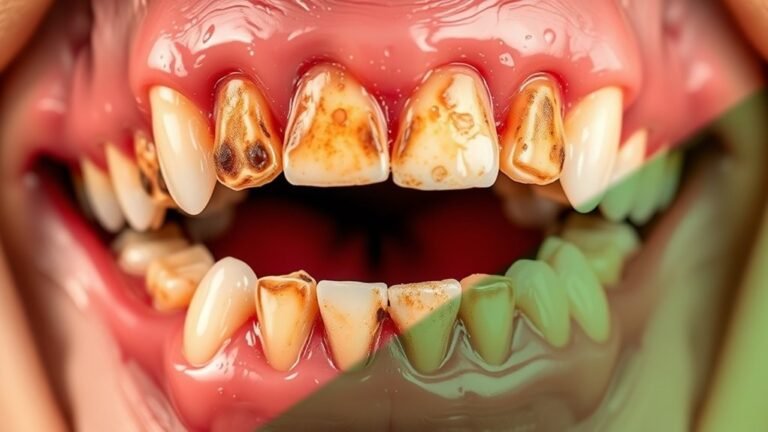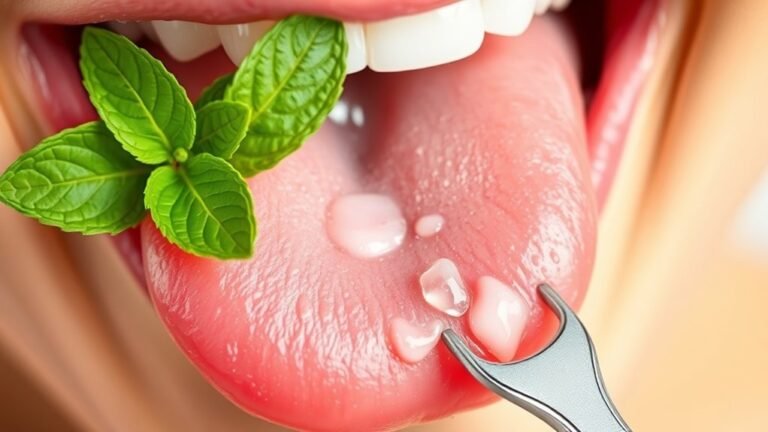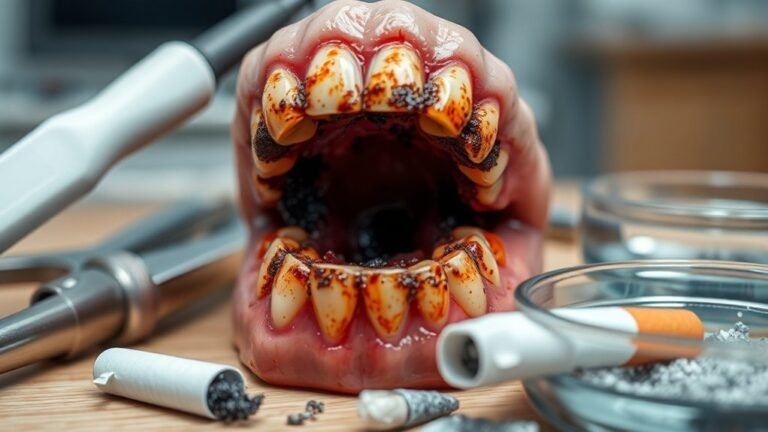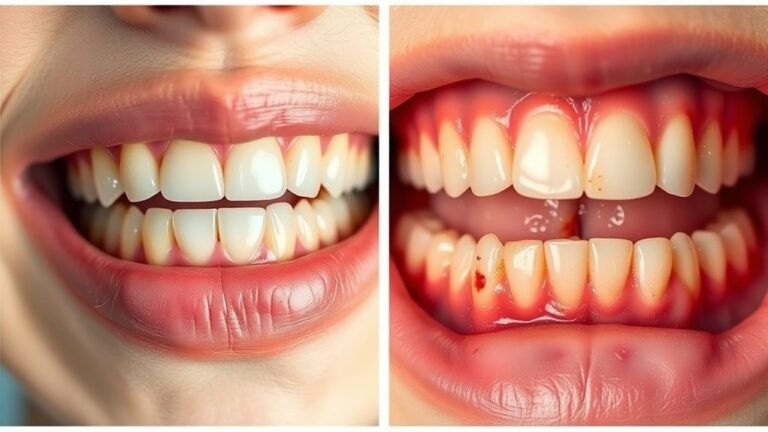How Do Poor Oral Hygiene Habits Disrupt Microbial Balance Causing Infections
Poor oral hygiene disrupts the microbial balance in your mouth, allowing harmful bacteria to thrive. When you neglect brushing and flossing, plaque builds up, creating an environment for these bacteria to multiply. This can lead to gum disease, cavities, and infections. A healthy microbiome relies on a mix of beneficial bacteria to protect oral health, and neglect increases your risk for serious oral issues. There’s much more to discover about maintaining your oral health and preventing infections.
Key Takeaways
- Poor oral hygiene leads to plaque buildup, allowing harmful bacteria to thrive and disrupt the microbial balance in the mouth.
- An imbalance in oral bacteria increases the risk of gum disease, cavities, and infections due to overgrowth of pathogenic species.
- Neglecting brushing and flossing can result in bad breath and tooth sensitivity, signaling underlying bacterial issues.
- Harmful bacteria from poor oral hygiene can enter the bloodstream, potentially leading to systemic health problems beyond oral infections.
- Maintaining a healthy oral microbiome through proper hygiene practices is essential for preventing infections and promoting overall health.
The Importance of Oral Hygiene in Microbial Balance
Maintaining proper oral hygiene is essential for ensuring a healthy microbial balance in your mouth. When you neglect your dental care, you risk developing oral microbiome dysbiosis, a condition where harmful bacteria outnumber beneficial ones. This imbalance can lead to various oral health issues, including gum disease and cavities. Regular brushing, flossing, and routine dental check-ups help keep harmful bacteria in check and support the growth of beneficial microorganisms. By removing plaque and food particles, you minimize the risk of infection and promote a healthier environment in your mouth. Remember, good oral hygiene isn’t just about avoiding bad breath; it’s vital for maintaining the intricate balance of your oral microbiome, which directly influences your overall health.
The Role of Bacteria in Oral Health
Bacteria play a vital role in your oral health, acting as both beneficial and harmful agents. While beneficial bacteria help maintain a balanced microbiome, harmful pathogenic bacteria can lead to dental issues when they overpower the good ones. Understanding this balance is essential for effective oral hygiene practices and overall wellness.
Beneficial Oral Bacteria
While many people associate bacteria with dental problems, a diverse community of beneficial oral bacteria plays an essential role in maintaining oral health. These bacteria help to balance the oral microbiome, preventing the overgrowth of harmful pathogens. They contribute to the breakdown of food particles, aiding in digestion, and produce substances that inhibit the growth of disease-causing bacteria. Beneficial oral bacteria also help in the production of enzymes and vitamins, which are significant for your overall health. By promoting a healthy pH level and enhancing your immune response, these bacteria protect your gums and teeth from infections. Maintaining good oral hygiene habits supports the thriving population of beneficial oral bacteria, ensuring a healthier mouth and reducing the risk of dental issues.
Harmful Pathogenic Bacteria
Though beneficial bacteria are vital for oral health, harmful pathogenic bacteria can disrupt this balance and lead to serious dental issues. These harmful bacteria, such as Streptococcus mutans and Porphyromonas gingivalis, thrive in an environment created by poor oral hygiene. They produce acids that erode tooth enamel and toxins that inflame gum tissue. When you neglect regular brushing and flossing, you create a breeding ground for these pathogens, increasing your risk of cavities and gum disease. Over time, this imbalance can also contribute to infections that may require extensive dental treatment. To maintain ideal oral health, it’s necessary to address harmful pathogenic bacteria through consistent hygiene practices and regular dental check-ups.
Balance and Disruption
Maintaining a delicate balance between beneficial and harmful bacteria is essential for ideal oral health. Your mouth hosts a diverse microbial community that plays a vital role in preventing infections and promoting overall well-being. When you neglect oral hygiene, a microbial imbalance occurs, allowing harmful bacteria to flourish. This disruption can lead to plaque formation, gum disease, and cavities. Beneficial bacteria help control pathogenic growth by competing for resources and producing antimicrobial substances. However, poor hygiene habits, like infrequent brushing and skipping flossing, can tip this balance. To protect your oral health, you must prioritize consistent oral care routines, which helps maintain the right balance of bacteria and reduces the risk of infections caused by microbial imbalance.
Consequences of Neglecting Brushing and Flossing
Neglecting to brush and floss regularly can lead to significant oral health issues. When you practice poor oral hygiene, plaque builds up on your teeth, creating an environment for harmful bacteria to thrive. This can result in gum disease, cavities, and bad breath. As bacteria proliferate, they can disrupt your mouth’s natural microbial balance, increasing the risk of infections that extend beyond oral health. You may also experience tooth sensitivity and pain, making it uncomfortable to eat or speak. Ignoring these consequences can lead to more severe health problems, including tooth loss and systemic issues that affect your overall well-being. Prioritizing regular brushing and flossing is essential for maintaining a healthy mouth and preventing these negative outcomes.
How Plaque Formation Leads to Infections
When you allow plaque to accumulate on your teeth, it creates a breeding ground for harmful bacteria that can lead to infections. This plaque buildup consists of food particles, saliva, and bacteria, forming a sticky film that adheres to your teeth. If you neglect proper oral hygiene, the bacteria in plaque can multiply quickly, producing toxins that irritate your gums and cause inflammation. Over time, this can result in gingivitis, a precursor to more severe infections like periodontitis. The bacterial imbalance disrupts your mouth’s microbial ecosystem, making it easier for pathogens to thrive. Regular brushing and flossing can prevent plaque buildup, safeguarding your oral health and reducing the risk of infections. Prioritizing your oral hygiene is essential for maintaining a healthy mouth.
The Impact of Diet on Oral Microbial Ecosystem
A balanced diet plays an essential role in shaping the oral microbial ecosystem, influencing the types and quantities of bacteria that thrive in your mouth. Your food choices can either promote beneficial bacteria or encourage harmful ones, impacting your overall oral health.
| Food Type | Impact on Oral Health | Example Effects |
|---|---|---|
| Sugary Foods | Increases harmful bacteria | Cavities, gum disease |
| Fiber-Rich Foods | Supports beneficial bacteria | Improved gum health |
| Acidic Foods | Disrupts pH balance | Enamel erosion |
Incorporating oral health education into your daily routine can help you make informed dietary choices, fostering a balanced microbial environment and reducing the risk of oral infections.
Common Oral Diseases Linked to Poor Hygiene
Maintaining proper oral hygiene is essential, as poor practices can lead to a range of common oral diseases. Neglecting your dental care can result in plaque buildup, which often leads to gingivitis, an early stage of gum disease. If left untreated, it can progress to periodontitis, causing severe damage to your gums and teeth. Additionally, tooth decay is a frequent consequence of inadequate brushing and flossing, resulting in cavities that can harbor harmful bacteria. These bacteria can lead to painful oral infections, compromising your overall health. Bad breath, or halitosis, is another common issue stemming from poor hygiene. By prioritizing your oral care routine, you can considerably reduce the risk of these diseases and maintain a healthier mouth.
Strategies for Maintaining a Healthy Oral Microbiome
To maintain a healthy oral microbiome, you should focus on effective brushing techniques, a balanced diet, and the use of probiotic oral products. Regular brushing removes plaque and bacteria, while nutritious foods support microbial balance. Incorporating probiotics can further enhance your oral health by fostering beneficial bacteria.
Regular Brushing Techniques
Two key strategies for effective brushing can greatly influence your oral microbiome. First, focus on technique. Use a soft-bristled toothbrush and angle it at 45 degrees to your gums. This helps remove plaque without damaging your enamel or gums. Make sure to brush for at least two minutes, covering all surfaces of your teeth and tongue.
Second, maintain consistent brushing habits. Aim to brush twice a day—once in the morning and once before bed. Regularity helps prevent bacterial overgrowth and promotes a balanced oral environment. Make it a habit to replace your toothbrush every three to four months or sooner if bristles fray. By implementing these strategies, you can support a healthy oral microbiome and reduce the risk of infections.
Balanced Diet Choices
A balanced diet plays an essential role in supporting your oral microbiome, as certain foods can either promote or hinder microbial health. By making informed balanced diet choices, you can encourage beneficial bacterial colonization while minimizing harmful bacteria. Incorporate plenty of fruits and vegetables, which are rich in vitamins and minerals that nourish your gums and teeth. Whole grains, lean proteins, and healthy fats also support overall health, including oral health. Limit sugary snacks and beverages, as they can lead to increased bacterial growth and acid production, harming your dental microbiome. Additionally, stay hydrated to maintain saliva flow, which helps balance your mouth’s microbial environment. Prioritize these dietary strategies to foster a thriving oral ecosystem.
Probiotic Oral Products
While maintaining a healthy oral microbiome can feel challenging, incorporating probiotic oral products into your routine can make a significant difference. These products, such as lozenges, mouthwashes, and chewing gums, introduce beneficial bacteria that can help restore balance in your mouth. By promoting the growth of good bacteria, probiotic oral products can inhibit harmful microorganisms, therefore reducing the risk of infections. They also play a role in biofilm formation, where beneficial bacteria create a protective layer against pathogens. Regular use of these products not only enhances your oral health but also supports overall well-being. Remember, a balanced microbiome is essential for preventing dental issues, so consider adding probiotics to your daily oral care regimen for ideal results.
Frequently Asked Questions
Can Stress Affect My Oral Hygiene Habits and Microbial Balance?
Yes, stress can negatively impact your oral hygiene habits. It may lead to neglecting dental care, resulting in an imbalance of oral microbes, which can increase the risk of infections and other dental issues.
How Often Should I Replace My Toothbrush for Optimal Oral Health?
When it comes to your toothbrush, don’t wait until it’s seen better days. Replace it every three to four months, or sooner if the bristles fray. This keeps your oral health in tip-top shape.
Are There Specific Foods That Can Worsen Oral Infections?
Yes, sugary foods, acidic beverages, and processed snacks can worsen oral infections. They promote harmful bacteria growth and decrease saliva production, which is essential for neutralizing acids and maintaining oral health. Avoid these to protect your mouth.
Does Smoking Impact the Balance of Oral Bacteria?
Yes, smoking disrupts the balance of oral bacteria, decreases saliva production, and promotes harmful pathogens. It leads to inflammation and increases the risk of gum disease, cavities, and other oral infections you might face.
Can Probiotics Help Improve Oral Microbial Health?
Yes, probiotics can help improve oral microbial health. They introduce beneficial bacteria, potentially enhancing the balance in your mouth. This may reduce harmful bacteria, promoting overall oral health and decreasing the risk of infections.
Conclusion
In neglecting your oral hygiene, you might think you’re saving time, but you’re actually inviting a host of unwelcome guests—bacteria that thrive on plaque and decay. Ironically, this so-called shortcut leads to infections and costly dental visits later on. By adopting simple habits like brushing and flossing, you can restore harmony to your oral microbiome. So, why not invest a few minutes daily to protect your smile? After all, a healthy mouth is a happy mouth.
